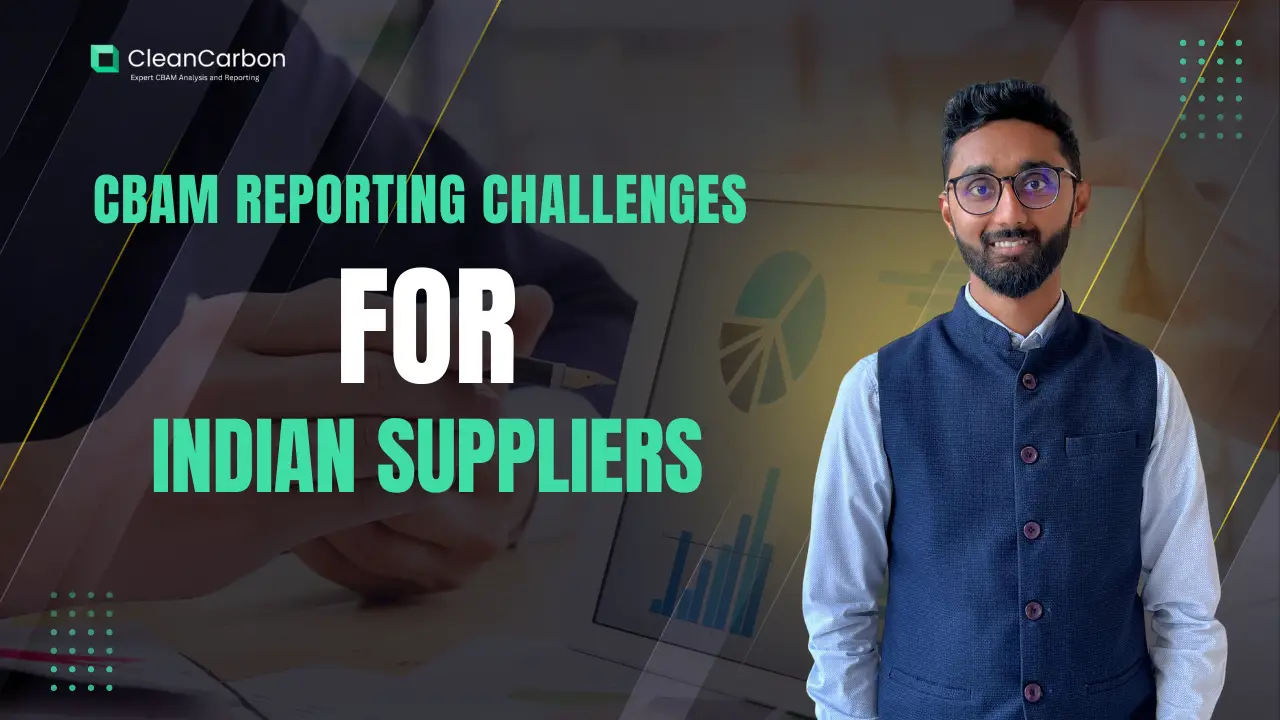Video
2026

EU CBAM Reporting Rules 2026 for Suppliers and EU Buyers
CBAM reporting has become mandatory from January this year, marking a major shift in how exports to the European Union are regulated.
This means that any supplier exporting products made of iron and steel, aluminium, or cement from India to the EU must now comply with strict CBAM reporting and verification requirements.

CBAM 2026 Is Coming — Here’s Why Exporters Trust CleanCarbon.ai | Explains Founder Nilesh Bhattad
CBAM compliance is no longer optional — and spreadsheets won’t survive 2026. In this short video, our founder Mr Nilesh Bhattad explains why CleanCarbon.ai is purpose-built for EU CBAM compliance, and how exporters can move from manual reporting to audit-ready, verified carbon data — without disruption.
2025

CBAM Reporting: Why Should You be Worried? I Simplified
In this video, CBAM expert Mr. Nilesh Bhattad simplifies what you need to know about the European Union’s Carbon Border Adjustment Mechanism that is set to impact your export business to the EU from January 2026. The CBAM tax will become mandatory from January, 2026 on the amount of carbon emissions associated with your products in sectors like Iron and Steel, Aluminium, Cement, Fertilizers, Chemical and Electricity.

Why Early CBAM Reporting Gives You a Strategic Advantage
Early CBAM reporting offers businesses a critical advantage—ensuring market access, reducing financial risks, and strengthening importer relationships. It enables timely error detection, improves data accuracy, and future-proofs operations against evolving EU carbon regulations. This blog covers how early action not only avoids penalties but also enhances competitiveness in a rapidly transforming global trade landscape.

How CBAM Helps In Business Expansion in EU: Explained
Non-compliance with the EU’s Carbon Border Adjustment Mechanism (CBAM) can limit market access, disrupt buyer relationships, and lead to financial penalties. In this video, we explain why timely CBAM reporting is crucial for exporters in carbon-intensive sectors to stay competitive, build trust, and future-proof their EU trade.

CBAM Reporting Challenges for Indian Suppliers: Navigating Compliance and Trade Impacts
The EU’s Carbon Border Adjustment Mechanism (CBAM) is reshaping global trade, especially for countries like India that rely heavily on exports to Europe. While the mechanism aims to level the carbon playing field, it brings serious reporting challenges—particularly for Indian small and medium enterprises (SMEs). In this video, we look at the CBAM reporting challenges.

CBAM: Strategic Trade Disruption or Sustainability Catalyst?
The Carbon Border Adjustment Mechanism (CBAM) is poised to redefine global trade by embedding climate risk into business operations. Its implementation is expected to disrupt international markets—especially affecting developing economies that heavily depend on exports in carbon-intensive, CBAM-regulated sectors. Watch the full video to understand how CBAM changes trade and businesses.

How CBAM is Changing Indian Steel Industry.
Under the CBAM reporting rules, there are some special parameters for the iron and steel sector. In this Video, we understand specific reporting rules and requirements for the iron and steel sector.
